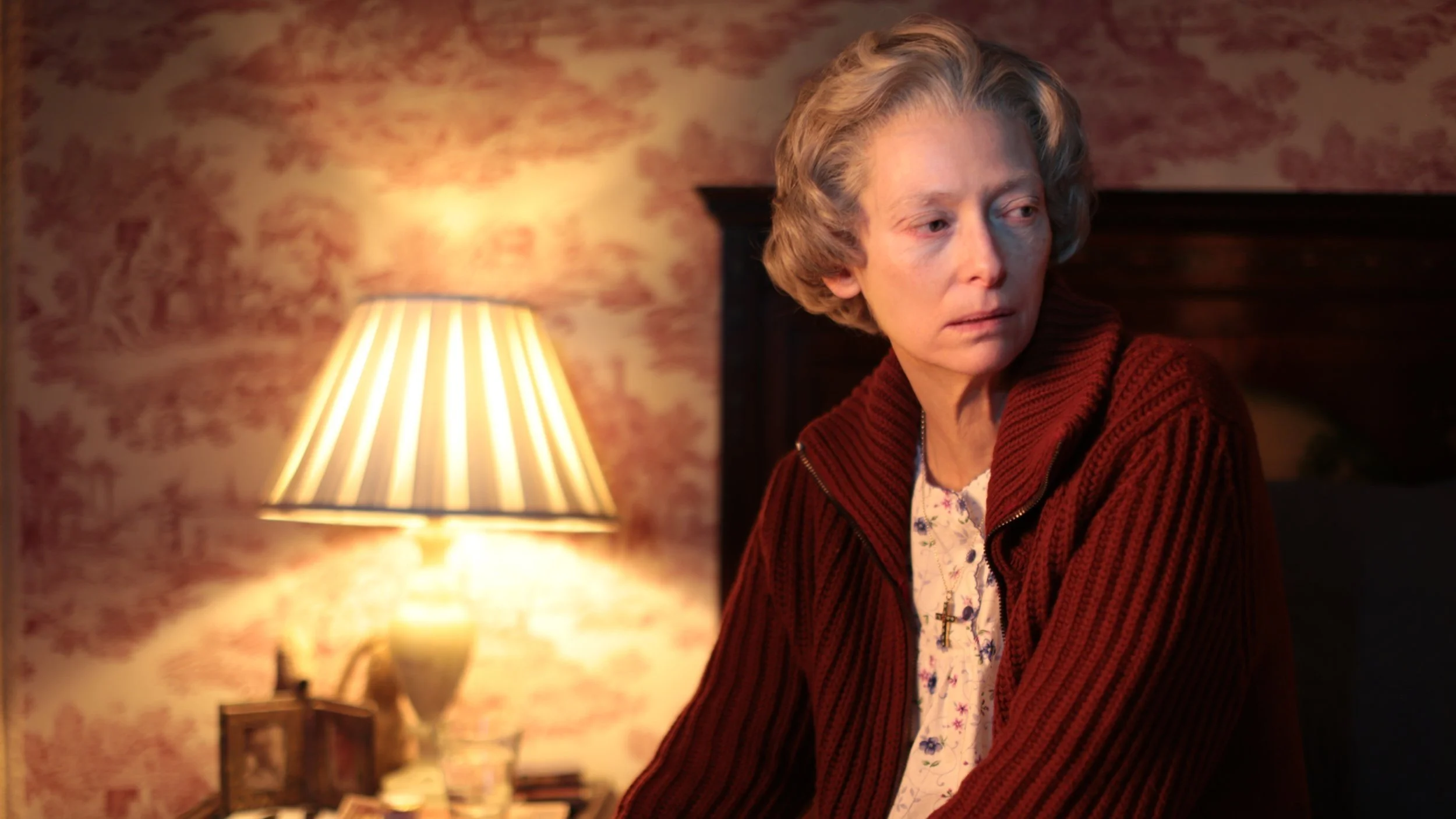The Eternal Daughter
Joanna Hogg and Tilda Swinton move into different territory with the tale of a mother and daughter confronting their past.
Tilda Swinton
The latest film from Joanna Hogg is that very rare beast: a film of total originality. I approached it with doubts for two reasons. One was that I had seen it described misleadingly as a tale that was Gothic in character (not my favourite kind) and the other that, although Hogg is a writer/director acclaimed by many, I have seldom taken to her work (I did quite like her debut feature 2007 Unrelated but did not warm to her subsequent films including the highly praised two-part work The Souvenir). Nevertheless, I found that I was fascinated by The Eternal Daughter.
The opening scenes of the film might indeed suggest that it would be a piece that would grow into something related to classic horror tales. At the outset we see Rosalind and Julie Hart, a mother and daughter, arriving by taxi at a once grand country house that has become a hotel. They do so late in the evening and find that a receptionist (Carly Sophia-Davies) is the only person on duty while the establishment seems strangely devoid of any visible guests. It is a building standing in its own land and one in which doors creek and unexpected sounds are heard such as branches tapping on widows in a manner to cause unease. In other words, we have touches that could indeed be preparing the way for a ghost story or for a drama in which, whether or not by supernatural means, the visitors will find themselves threatened.
But, instead of anything on those lines, Hogg is building a situation in which realism is replaced by something that turns a certain surface naturalism into something inherently stylised. One distant comparison offers itself in that I was reminded of stage works by J.B. Priestley including his so-called ‘Time Plays’ and what is now his most famous work An Inspector Calls. In her own way Hogg is creating a setting in which mother and daughter can engage in conversations that will give insights into their characters and their lives and also bring to the surface truths that have been hidden. If this set-up represents fresh ground for Hogg, one feature nevertheless remains very familiar. As in most of her work the two central characters here are well-off and relatively upper-class and the lifestyle of those in that milieu, including matters of etiquette and restraint and how they express themselves, are captured with complete assurance. This brings total conviction to those moments in which Julie, who had known of her mother’s past associations with the building and had brought her there in that knowledge, learns details of her mother’s life which they had chosen never to discuss before.
As the film proceeds one other character is introduced and given a significant role, that being a nightwatchman played by Joseph Rydell. But for the most part the focus is directly on Julie and her mother. That is as it should be because The Eternal Daughter is indeed a subtle exploration of the mother/child relationship as it endures through life. The extent to which such people may yet not know each other to the full is illustrated by the discoveries that Julie makes about Rosalind but even more central is the complexity that can exist within a child and parent relationship. A loving child will feel a sense of duty but may also, as in this instance, feel resentment for the sacrifices that duty imposes due to it holding them back from the free exploration of their own individuality. In these circumstances Julie’s love for her mother co-exists with other feelings less readily allowed to surface.
In this instance Hogg chooses to add another layer too, one which may be particularly relevant to her. We learn that Julie is a filmmaker and this leads to The Eternal Daughter also looking at the way in which an artist finds material by drawing on the lives of those around them. Be it fair or unfair, they are used. Personal in another way is the presence in the film of a dog belonging to Julie: much featured, this engaging animal, Louis, is indeed a dog owned by the film’s star, Tilda Swinton.
Given the way in which The Eternal Daughter creates a world that proves to be artificial, it is not out of keeping that, in addition to playing Julie, Tilda Swinton should also portray her mother. Since they share so many scenes together awareness of that double role may for some make the artifice too apparent (it certainly leads to underlining the number of shots in which we cut from one character to the other to limit Swinton being seen twice over in the same image). However, fine actress that she is, Swinton carries off both roles with complete conviction and I was not put off by this unusual casting. It is in any case all part of a film that is impressively made on every level including Ed Rutherford’s fine colour photography and the adroit use of pre-existing music on the soundtrack, Bartok included. Admittedly the film doesn't reach a close that feels definitive (not on one viewing at least) and I don’t quite call it a masterpiece, but it is a very haunting film. Indeed, I would describe The Eternal Daughter as being fruitfully strange and in a manner all its own as it looks deep into key aspects of human experience.
MANSEL STIMPSON
Cast: Tilda Swinton, Joseph Rydell, Carly-Sophia Davies, August Joshi, Crispin Buxton, and Louis the dog.
Dir Joanna Hogg, Pro Ed Guiney, Emma Norton, Andrew Lowe and Joanna Hogg, Screenplay Joanna Hogg, Ph Ed Rutherford, Pro Des Stéphane Collonge, Ed Helle le Fevre, Costumes Grace Snell.
Element Pictures/A24/BBC Films/JWH Films/Sikelia Productions-BFI Films.
96 mins. UK/USA. 2022. UK Rel: 24 November 2023. US Rel: 2 December 2022. Cert. 12A.


